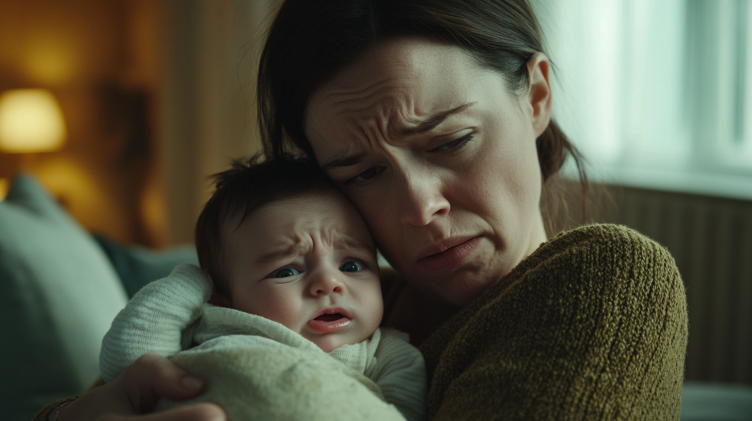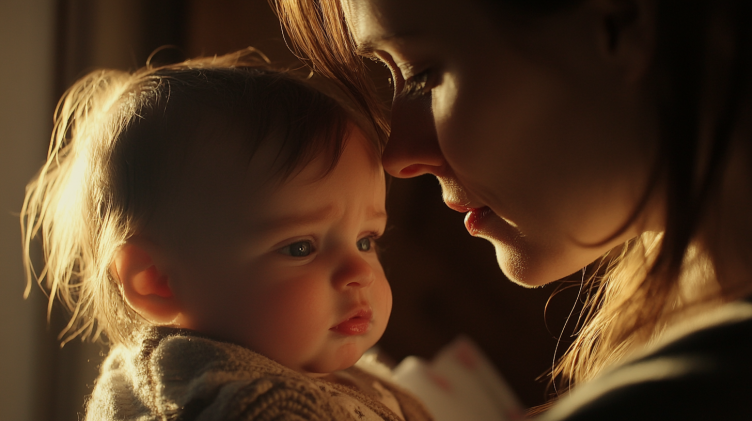As a new mom, you’ve probably heard the saying, “Calcium is key to your baby’s bone development.” But how do you actually know if your baby is getting enough calcium? Well, don’t worry! Today, we’ll explore how to spot calcium deficiency in your baby and the signs you should never ignore.
1. Crying Baby? Calcium Deficiency Might Be the Cause
Crying babies are a common challenge for parents, but have you ever considered that your baby’s tears could be due to calcium deficiency rather than hunger or discomfort?
When a baby’s calcium levels are low, it can increase nerve sensitivity, making them more irritable and prone to crying. Calcium is essential for nerve transmission, and without it, babies may struggle to sleep, waking up crying repeatedly.

What to Do?
If your baby cries frequently without clear signs of hunger or discomfort, check their calcium intake. If you’re unsure, consult your pediatrician and consider a blood test.
2. Leg Cramps in Babies? Calcium Deficiency Could Be the Culprit
Seeing your baby’s tiny legs cramp up can be frightening. One common cause of leg cramps in babies, especially after 6 months, is calcium deficiency.
Why does low calcium lead to leg cramps? Calcium plays a critical role in the proper functioning of muscles and nerves. When there’s a shortage, muscles contract irregularly, leading to painful cramps.

What to Do?
If your baby experiences leg cramps, have their calcium levels checked. Ensure your baby gets enough calcium-rich foods, like milk and egg yolks. Sunshine also helps calcium absorption.
3. Is Your Baby’s Sleep Disturbed? Calcium Might Be the Reason
Does your baby toss and turn, waking up crying, especially before 6 months? Calcium deficiency could be a hidden factor behind your baby’s restless sleep.
Calcium is vital for nervous system function. Without enough calcium, the nerves can become overstimulated, making it hard for babies to relax and sleep soundly.

What to Do?
Ensure your baby gets plenty of daytime activity to burn off excess energy. Create a peaceful, comfortable sleep environment. If the sleep problems persist, it might be time to consult your doctor about supplementing calcium.
4. Slower Bone Development? Calcium Could Be the Missing Link
If your baby’s height is below average for their age, it could be a sign of calcium deficiency. Calcium is essential for strong bone growth, and insufficient intake can lead to weak bones and conditions like rickets.
Why does calcium impact bone development? Calcium is a key building block for bones, especially during growth stages. Without enough calcium, bones may soften and become weak.

What to Do?
To support your baby’s growth, provide calcium-rich foods like dairy, fish, and tofu. Sun exposure also aids calcium absorption, so ensure your baby gets enough sunlight.
5. Slow or Abnormal Tooth Development? Calcium Might Be the Issue
Around six months of age, babies start teething. If your baby’s teeth are coming in slowly or seem brittle, it might indicate a calcium deficiency.
Why does calcium impact tooth development? Calcium is a crucial component of healthy teeth. A lack of calcium can slow tooth eruption and even cause teeth to become loose or prone to cavities.

What to Do?
Make sure your baby is getting enough calcium, along with Vitamin D to help with absorption. With proper calcium supplementation and a healthy diet, your baby’s teeth can develop normally.
How to Prevent Calcium Deficiency in Your Baby?
- Breastfeeding or Formula Feeding: Breast milk is an excellent source of calcium. If your supply is low, supplement with formula.
- Introducing Calcium-rich Foods: From six months, start adding calcium-rich foods like tofu and vegetable purees.
- Get Sunlight: Sun exposure helps your baby’s body produce Vitamin D, which is necessary for calcium absorption.
- Calcium Supplements: Under the guidance of a doctor, consider supplementing with calcium if needed.

Conclusion: Calcium Deficiency Symptoms in Babies
Calcium deficiency can manifest in several ways, such as frequent crying, leg cramps, restless sleep, slow bone development, and abnormal tooth growth. If you notice any of these signs, take action promptly. Proper feeding, calcium supplements, and sunshine can help ensure your baby’s health and development remain on track.



















